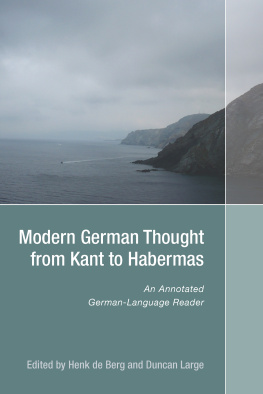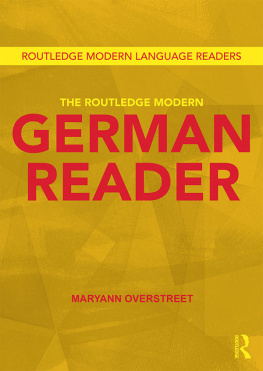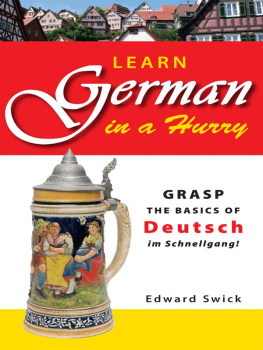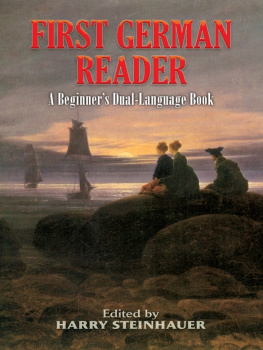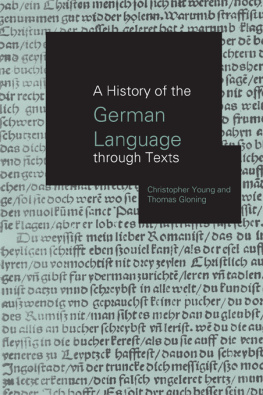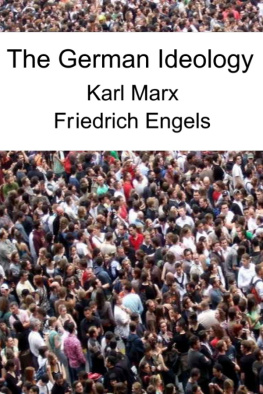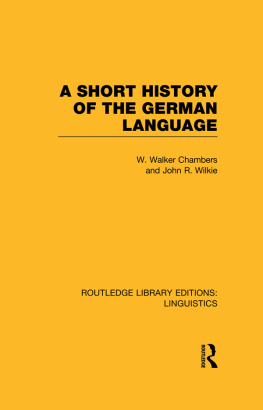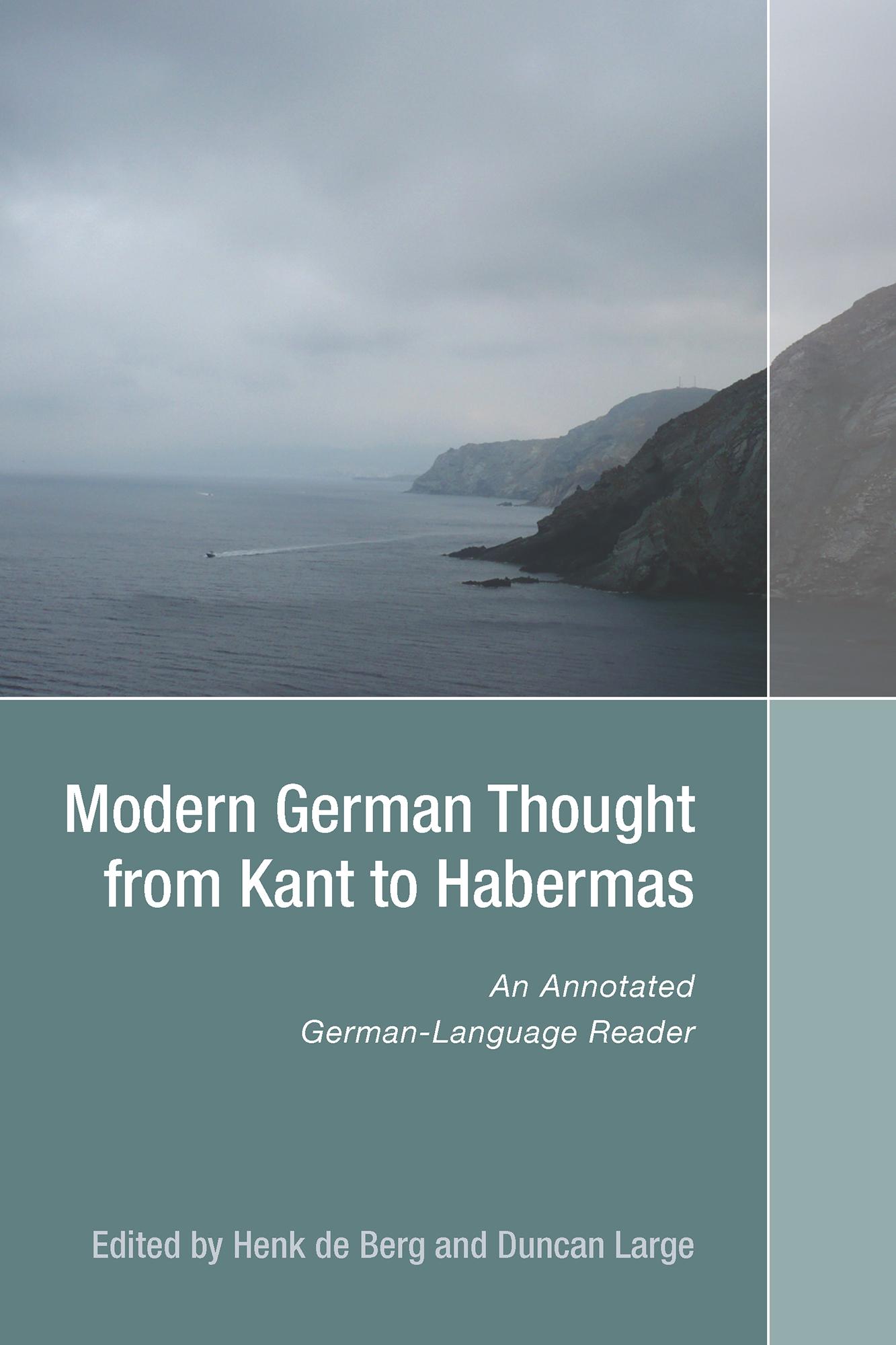Acknowledgments
W e are grateful to the following people who commented on portions of the manuscript or helped us in other ways: Paul Bishop, Craig Brandist, Ania de Berg, Jaap de Berg, Katy Heady, Christopher Janaway, Caroline Pearce, Ulrich Schlsser, Robert Stern, Peter Thompson, Galin Tihanov, and Sheila Watts. We should also like to thank Editorial Director Jim Walker and Production Editor Jane Best at Camden House.
Material under copyright has been included by kind permission of the following publishers and literary agents:
Excerpts from Jrgen Habermas, Die Moderne ein unvollendetes Projekt Suhrkamp Verlag, Berlin.
Excerpts from Martin Heidegger, Sein und Zeit Walter de Gruyter, Berlin.
Excerpts from Max Horkheimer and Theodor W. Adorno, Dialektik der Aufklrung: Philosophische Fragmente S. Fischer Verlag, Frankfurt am Main.
Excerpts from Georg Lukcs, Einfhrung in die sthetischen Schriften von Marx und Engels Ktai & Bolza, Budapest.
Introduction: German Thought since Kant
I ntroducing a survey of modern French philosophy, Vincent Descombes summarizes the post-war developments covered by his book as follows:
In the recent evolution of philosophy in France we can trace the passage from the generation known after 1945 as that of the three Hs to the generation known since 1960 as that of the three masters of suspicion: the three Hs being Hegel, Husserl and Heidegger, and the three masters of suspicion Marx, Nietzsche and Freud.
What is perhaps most striking about these six named matres penser is that they are all German, or at least German-speaking. Descombess observations thus illustrate well the outstanding importance of German thought: for over two centuries, German thinkers have mattered in philosophy, not just in the German-speaking world, but world-wide.
The reputation of philosophy teaching in Berlin, in particular, ensured that from the time of Hegel in the 1820s until the Second World War what is now known as the Humboldt University acted as a magnet for generations of the worlds brightest philosophical talents. To this day, many advanced philosophy courses at universities outside the German-speaking world require students to be able to work relatively comfortably with German-language texts.
This collection aims to explore, explain, and celebrate the German-language philosophical tradition since Kant. In the last quarter of the eighteenth century, in the space of a generation, the German-speaking world established itself as a European intellectual and cultural powerhouse rivaling France and England. In musical Vienna, the composers Haydn, Mozart, and Beethoven pioneered the classical sonata form; in literary Weimar, Goethe and Schiller set about establishing a classical centre; In this way, Kant both limited and grounded the use of reason.
The upshot of this new approach was that we can only ever know the world in accordance with the way our cognitive apparatus structures our experience of it. Kant himself spoke of a Copernican Revolution in philosophy: the idea that the mind must conform to the world is replaced by the view that the world (to the extent that it appears to us) cannot but conform to the mind. It was this radical change of perspective the shift towards the conditions of the possibility of human experience that transformed the way philosophy looked at itself and at the world.
Not only did Kant reorient the discipline, but in doing so he also made the German language philosophically respectable. Latin had been the lingua franca of European intellectual life from antiquity right through to the early Enlightenment. Of Leibnizs Nachla , for example, roughly 40 percent is in Latin, 30 percent in French, and only 15 percent in German.
Although this book celebrates the German tradition in philosophy, we have no intention of arguing for some kind of German genius, even if there have been plenty who have been eager to do so in the past. and that four of our writers, though German-speaking and German-writing, were born in territories that now lie outside Germany, indeed outside the German-speaking world as it is currently understood: Kant in Knigsberg (now Kaliningrad, Russia), Schopenhauer in Danzig (now Gdask, Poland), Freud in Freiberg (now Pbor, Czech Republic), and Lukcs in Budapest (Hungary). The geographical diversity of their provenance mirrors the huge and shifting spread of the German-speaking lands through modern history, a pluricentric polity at the heart of Europe characterized by inner diversity (a feature perpetuated in the federal structure of the postwar Bundesrepublik ) and invigorated by cultural cross-pollination from many neighboring traditions and ethnicities. By the same token, almost half of our writers Marx, Freud, Benjamin, Lukcs, Horkheimer, and Adorno are Jewish.
Given the fact that German philosophy is often thought of as a Professorenaktivitt , it is striking how few of our thinkers actually had more or less normal university careers. Kant may have been the first great modern philosopher to spend all of his time and efforts as a university professor of the subject,
Anti-Semitism, too, played a role in the professional development of our thinkers. Freuds appointment to the post of Professor Extraordinarius was delayed for several years (until 1902), partly because of his Jewishness. Three decades later, the academic careers of Max Horkheimer and Theodor W. Adorno were brutally interrupted by the National Socialist Machtergreifung , which forced both men (via Switzerland and Britain respectively) into exile, and into financially precarious research projects, in the United States. Similarly, Georg Lukcss Russian exile dashed any hopes he might have had for a proper university position. All three men would be appointed to full professorships only after returning to their home countries following the defeat of Nazism. Even more tragic was the fate of Walter Benjamin. Trying to flee Nazi-occupied France but refused entry into Spain, he took his own life at the age of forty-eight.
In some cases, the academic rootlessness was due not only to external circumstances, but also to inner resistance and an ambivalence towards academia. Schopenhauers lecturing career at Berlin University was notoriously brief, and in later life he published a highly critical essay, ber die Universitts-Philosophie, for which he was praised by Nietzsche, who cut short his own lecturing career at Basel University after only ten years. Benjamins career as a university teacher failed to get off the ground at all once he had withdrawn his post-doctoral thesis, Ursprung des deutschen Trauerspiels , in 1925.
The thinkers anthologized in this volume have more in common than just the German language. They also share an emphasis on social engagement. Much more so than their analytically oriented American and British counterparts, they insist on the nexus between philosophy and praxis. The phrase does not aim to create an opposition between philosophy and real life; the however (aber) that Friedrich Engels inserted after es kmmt when publishing his friends theses was misleading. Rather, Marx contends that philosophers should analyze the world with a view to changing it; in other words, that philosophy should play a central role in the transformation of the world.
Of course, German philosophers are not all trying to effect the same social changes. But most of them do believe that doing philosophy constitutes a social intervention, and that attempting to remain politically neutral and do just philosophy means that one is shirking ones responsibility. Even Hegel, who maintains that philosophy always arrives on the scene too late to do anything else than try to understand what has already happened, emphasizes the concrete reality of ideas. Indeed, few thinkers, if any, attach as much importance to the role of thought in human history as does Hegel. In any case, Hegelianism is a direct response to the social and political challenges of nascent modernity as well as to substantive philosophical issues, and there can be no doubt that Hegel saw his ideas as important elements in the making of the modern world. For all its metaphysical preoccupations, then, there is a strong worldliness to German philosophizing.

